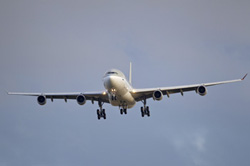A new era for aerospace power modules
SiC has a wide band gap, high thermal conductivity and high electric field breakdown strength that helps reduce power losses. These properties make it attractive for application in high-power devices. It facilitates superior switching and higher power density for a given voltage and rating current in a thinner and lighter device. High-temperature operability reduces the size and complexity of required cooling systems, and thus of overall power system architectures. After years of research and development, SiC devices are entering the market. The timing could not be better to investigate the enhanced modularity and performance of these components for all-electric aircraft — a major goal of avionics research. Scientists developed innovative SiC power modules for use on board aircraft with EU funding of the project 'Robust silicon-carbide technology for aerospace DC-DC conversion' (ROSIC). Research included a comprehensive analysis of future needs to ensure that stringent reliability criteria can be met cost effectively. Scientists began by benchmarking available transistor technologies, including bipolar junction transistors, junction gate field effect transistors and metal–oxide semiconductor field effect transistor (MOSFETs) to control current flow. A MOSFET device was chosen and its steady-state and transient characteristics evaluated. The team then selected the MOSFET substrates and established bonding parameters. ROSIC tested final modules to enable long-term characterisation of both the packaging and module performance, verifying the integrity of both under aircraft operating conditions. Research has expanded knowledge and understanding of SiC MOSFET performance and robustness. Scientists made a major contribution to potential avionics applications with consolidation of built-in-reliability design methodology. The SiC MOSFET technology promises to significantly reduce the size and weight of avionic power switches compared to standard Si technology. This will translate to important reductions in fuel consumption and emissions, in line with EU goals for greener air transport. ROSIC's SiC power modules are ready for industrialisation, promising major impact on the safety, reliability and sustainability of air travel.







